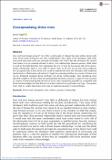Files in this item
Conceptualizing divine trust
Item metadata
| dc.contributor.author | Stigall, Jason | |
| dc.date.accessioned | 2022-08-29T08:30:10Z | |
| dc.date.available | 2022-08-29T08:30:10Z | |
| dc.date.issued | 2022-08-25 | |
| dc.identifier | 280603016 | |
| dc.identifier | 515e6bcb-4139-4f07-b03d-90c85d88fb8b | |
| dc.identifier | 000844413000001 | |
| dc.identifier | 85141955125 | |
| dc.identifier.citation | Stigall , J 2022 , ' Conceptualizing divine trust ' , Religious Studies , vol. FirstView . https://doi.org/10.1017/S0034412522000427 | en |
| dc.identifier.issn | 0034-4125 | |
| dc.identifier.uri | https://hdl.handle.net/10023/25903 | |
| dc.description.abstract | Does God trust human persons? Very little in philosophy of religion has been written about God's trust, which seems striking for two joint considerations. First, many of the Abrahamic faith traditions posit that union and close personal relationship with God is the telos of human life. Second, trust seems to be an essential element in ideal, close relationships between persons. While there is much in the faith literature that emphasizes the role of trust on the human side of the divine–human relationship, there is very little on divine trust. To fill this lacuna, this article addresses the conceptual issue of how divine trust could be understood within the Abrahamic faith traditions (particularly in Christianity and Judaism). I begin by examining whether an account of divine trust can be developed alongside divine attributes like divine foreknowledge. After identifying some plausible conditions of trust within the philosophical literature, I present a couple of trust scenarios as a means of demonstrating that divine trust is not only conceptually plausible (i.e. compatible with divine foreknowledge), but that divine trust is best construed as a particular trust type – therapeutic trust. That is, I argue that divine trust aims at inspiring humanity's trustworthiness. | |
| dc.format.extent | 21 | |
| dc.format.extent | 372402 | |
| dc.language.iso | eng | |
| dc.relation.ispartof | Religious Studies | en |
| dc.subject | Divine trust | en |
| dc.subject | Therapeutic trust | en |
| dc.subject | Reliance | en |
| dc.subject | Personal relationships | en |
| dc.subject | BR Christianity | en |
| dc.subject | BM Judaism | en |
| dc.subject | T-NDAS | en |
| dc.subject | NIS | en |
| dc.subject | MCC | en |
| dc.subject.lcc | BR | en |
| dc.subject.lcc | BM | en |
| dc.title | Conceptualizing divine trust | en |
| dc.type | Journal article | en |
| dc.contributor.institution | University of St Andrews. School of Divinity | en |
| dc.identifier.doi | https://doi.org/10.1017/S0034412522000427 | |
| dc.description.status | Peer reviewed | en |
This item appears in the following Collection(s)
Items in the St Andrews Research Repository are protected by copyright, with all rights reserved, unless otherwise indicated.

